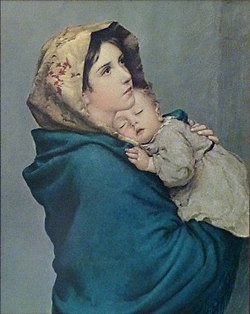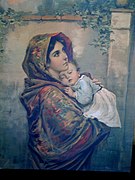Madonnina (painting)
This article needs additional citations for verification. (September 2024) |

The Madonnina, commonly known as the Madonna of the Streets (Italian: Madonna delle vie) or Madonna del riposo (Italian for 'Madonna of the Rest'), was a painting by Roberto Ferruzzi (1854–1934) that won the second Venice Biennale in 1897.
The models for this painting were 11-year-old Angelina Cian[a] and her younger brother.[1] Although not originally a religious painting, it was popularized as an image of the Virgin Mary holding her infant son, and has become the most renowned of Ferruzzi's works.
The original artwork is believed to be a vertical Sepia painting in a gold gilded frame approximately 27 cm (11 in) high and 21 cm (8.3 in) wide.
Fate of the original painting
[edit]The original painting made its first appearance at the Venice Biennale in 1897.[2] John George Alexander Leishman, a steel entrepreneur and diplomat, who died in France in 1924 in France,[3] bought the painting but not the reproduction rights; he is the last known owner. It is possible that the image entered a private art collection in Pennsylvania in the 1950s,[4] but the current location of the original is unknown. An original oil painting entitled Madonna and Child from Florence was bequeathed to the Sisters of St. Casimir by a certain Dr. Edgar W. Crass in 1950 and bears a striking resemblance to the current prints of the missing La Madonnina by Ferruzzi.
A second possibility is that it was lost at sea in the Atlantic Ocean on a voyage from Europe to the United States.[citation needed]
A claim that a version belonging to a religious group may be the original painting appeared recently[when?] but openly admits it lacks support.[5]
Another version possibly having belonged to an artist also surfaced but has not been guaranteed as authentic by the dealer offering it.[6]
Popular usage
[edit]Although the original has disappeared, it has not hindered the popularity and use of the image. Copies of the original are frequently featured on holy cards, portraits, and greeting cards. The belief and hope that it will still be found somewhere is very real and the painting, if found, is said to be worth $18 million USD.[citation needed]
The following are several notable uses of the image:
- The Madonna of the Streets is featured as a mosaic in Sts. Peter and Paul Church, San Francisco, California.[7]
- Members of the Sisters of Life receive a medal of the Madonna of the Streets at their first profession.[8]
Gallery
[edit]See also
[edit]Notes
[edit]- ^ One source cites her first name as Angela, but this is probably incorrect. Cian was her maiden surname and her surname at the time of the painting's creation. She was later married to Antonio Bovo (with one source citing the surname as Boro, probably incorrectly).[citation needed]
References
[edit]- ^ "Madonnina del Ferruzzi" (in Italian). luvigliano.it. Retrieved 17 December 2014.
- ^ "ecatholic2000.com - Offline". www.ecatholic2000.com.
- ^ "Madonna of the Street : University of Dayton, Ohio". udayton.edu.
- ^ Media, Franciscan. "Franciscan Media". www.americancatholic.org.
- ^ "The Madonnina". Archived from the original on 2007-05-15.
- ^ "Conditions of Sale". Archived from the original on 2002-10-13.
- ^ "Interior of SS. Peter and Paul Church". Archived from the original on 2006-11-25.
- ^ Formation of the Sisters of Life Archived 2007-02-07 at the Wayback Machine
External links
[edit]Madonnina Painting The original painting was painted by Francisco Goya, the name is La Virgen de la Encarnacion


